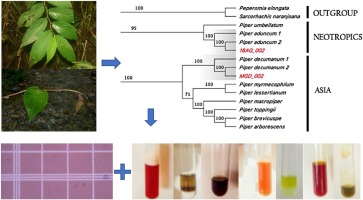Phytochemistry Letters ( IF 1.3 ) Pub Date : 2020-01-22 , DOI: 10.1016/j.phytol.2020.01.017 Mark Lloyd G. Dapar , Cesar G. Demayo , Ulrich Meve , Sigrid Liede-Schumann , Grecebio Jonathan D. Alejandro

|
The Manobo tribe in the Philippines is culturally rich in ethnomedicinal practices and known to use popular plants locally named as “Lunas” (meaning “cure”). One of these is “Lunas-bagon tapol” which was previously identified as Lunasia sp. (Rutaceae) based on vegetative morphology. The other species is “Lunas-buyo” which is similar in ethnomedicinal use and morphology. This broadly-based study verifies these two “Lunas”-named specimens and evaluates the phytochemicals present and cytotoxic properties. The sequences of nuclear ITS, and plastid rbcL, and matK were investigated for species identification. Molecular confirmation using BLASTn nucleotide database query revealed that the two confused “Lunas”-named specimens were members of Piperaceae and not Rutaceae. Phylogeny of Asian Piper using ITS sequences revealed “Lunas-bagon tapol” as Piper decumanum L. and “Lunas-buyo” as Piper aduncum L. with strong support (BS = 100 %). Both Piper species similarly showed the presence of alkaloids, flavonoids, steroids, tannins and fatty acids but the absence of cyanogenic glycosides. Also, P. decumanum has moderate amount of saponins while P. aduncum contains moderate amount of anthraquinones. A cytotoxic activity test using trypan blue exclusion method against normal lymphocytes from human blood showed low toxicity (91.9 % viable cells) for P. decumanum and mild toxicity (88.3 % viable cells) for P. aduncum when subjected to 1000 μg/ml of the stem ethanolic extracts. These results support the practical approach of molecular-based taxon identification and provide the biochemical and biological basis as to the constituents present and cytotoxic properties of these medicinal Piper species for future pharmacological research, conservation priorities and ecological management.
中文翻译:

菲律宾阿古萨·德尔苏尔马诺博部落使用的两种药用Piper物种的分子确认,组成和细胞毒性评估
菲律宾的Manobo部落在族裔医学实践方面文化底蕴深厚,并以当地流行的植物“ Lunas”(意为“治愈”)而闻名。其中之一是“ Lunas-bagon tapol”,以前被称为Lunasia sp。(芸香科)基于营养形态。其他物种是“ Lunas-buyo”,其在族裔医学用途和形态上相似。这项基础广泛的研究验证了这两个“ Lunas”命名的标本,并评估了存在的植物化学物质和细胞毒性特性。研究了核ITS序列,质体rbc L和mat K的序列,以进行物种鉴定。使用BLAST n进行分子确认核苷酸数据库查询显示,两个混淆的“ Lunas”名称标本是胡椒科成员,而不是芸香科。利用ITS序列对亚洲胡椒进行的系统发育分析显示,“卢纳斯-巴贡锥ol”为胡椒(Piper decumanum L.)和“卢纳斯-布约”(Lunas-buyo)为胡椒unc属(Piper aduncum L。)两种Piper物种均相似地显示出生物碱,类黄酮,类固醇,单宁和脂肪酸的存在,但不存在氰基苷。此外,P. decumanum有皂苷量适中而P. aduncum含有适量的蒽醌。使用台盼蓝排除法针对来自人血液正常淋巴细胞细胞毒性活性试验表明为低毒性(91.9%活细胞)P. decumanum和轻度毒性(88.3%活细胞),用于P. aduncum当经受1000微克/毫升的干乙醇提取物。这些结果支持了基于分子的分类群鉴定的实用方法,并为这些药用胡椒属物种的组成成分和细胞毒性特性提供了生化和生物学基础,以供将来进行药理研究,保护重点和生态管理。











































 京公网安备 11010802027423号
京公网安备 11010802027423号